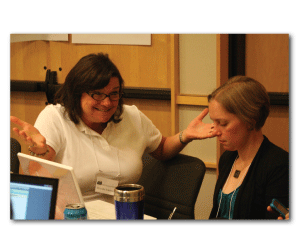
"I started using WISE 7 years ago. I was eager for new ways to help my students understand science concepts that are difficult to see...I continue to add new WISE projects to my curriculum and customize the projects that I have taught for years based on how I see my students making sense of the concepts.
The students like to run the models over and over again. For the English Language Learners these are especially important so they don't have a language barrier. The models and visualizations help to create scientific connections.
I use the grading tools to try to catch misconceptions... I found that giving comments first, and then a score was most successful in getting students to go back and think hard about their ideas. I have also started using exit tickets with questions from the project, so I can assess on a period to period basis where the misconceptions are... This helps me improve my teaching for the subsequent periods of the day as well as those classes the next day.
This is my seventh year using WISE, and I continue to learn. I have found it is harder to teach with inquiry because you need more time and patience. In the classroom, we seem to have less and less time. Even though it is sometimes harder, I feel that students take more control over their learning in the WISE inquiry projects and therefore it is more meaningful. Many of my colleagues have also started using WISE. It is wonderful to talk and discuss with my peers about runs. We come up with ideas about class instruction, grading of steps, and keeping students engaged in working with their partners."
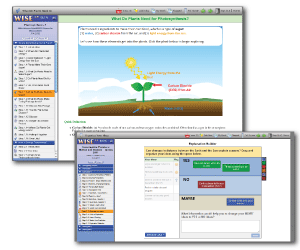
WISE units provide a window on the practice of authentic science by guiding students through inquiry investigations about relevant issues. Students build scientific understanding from productive, everyday ideas they have about science in real world contexts. WISE units engage students in diverse inquiry activities that reflect the practice of professional science, such as prediction and hypothesis, experimentation and data analysis, debate and argumentation, collaboration, critique, and reflection. WISE tools provide specific supports for these complex activities. WISE also has built in support for students to monitor their own progress, guiding students toward becoming autonomous learners.
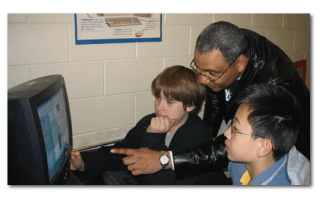
Teachers are essential to the success of WISE projects. During class, successful teachers survey students' ideas on an individual or small group basis (in real-time) and periodically address the whole class about difficult concepts. Furthermore, teachers guide and evaluate the learning process using a suite of classroom-based and online tools.
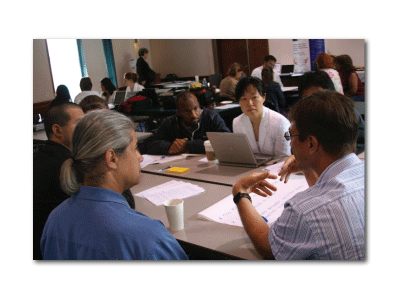
WISE units are products of partnerships between researchers, content experts, classroom teachers, and technology developers. We collaborate with teachers in our partner schools to identify key science topics that perplex students and successful ways to help students learn these difficult topics. Inquiry-based design principles guide the development of our WISE curricula. All units go through an iterative design process of multiple cycles of design, evaluation, and refinement; through annual summer retreats and teacher interviews, teachers provide key insights at multiple stages of this design process. WISE units align with state and national science content, experimentation, and inquiry standards from grade 5 to grade 12.
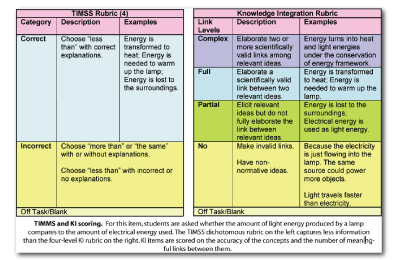
WISE curriculum units contain both embedded formative assessment items and pre- and post-project summative assessment items. They align with state content standards and have been validated by psychometric analyses to capture an equivalent or even broader range of student aptitudes than items used in standardized tests (Liu, Lee, Hoftstetter, & Linn, 2008; Linn et al., 2006).
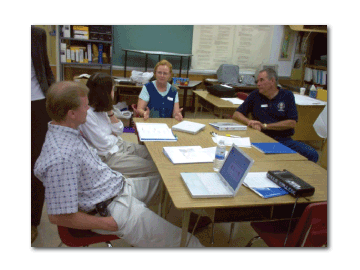
Administrators are central to teacher and student learning with WISE. Integrating WISE into a school's instructional vision, organizing teacher professional development, garnering technology resources, and ensuring exciting science learning opportunities for all students are just a few of the educational leader's many roles. Our research team works closely with school administrators to make sure we understand what it takes to integrate WISE into a district or school science program.
There are many ways for administrators to get involved with WISE. Please do not hesitate to contact us to begin the discussion!
WISE curricula are customizable and can be adapted to a variety of contexts and needs - beyond the traditional classroom. Extensive testing has led WISE to develop a variety of supports for diverse learners. Although each WISE unit consists of a carefully designed sequence of activities based on research findings, the activities are modular and can be combined with off-line activities, such as hands-on demonstrations and labs, and add value to existing instruction. For example, afterschool programs and home-school instructors teaching global climate change may want to use the WISE Global Climate Change's NetLogo model and associated prompts to allow students to experiment with different conditions.




